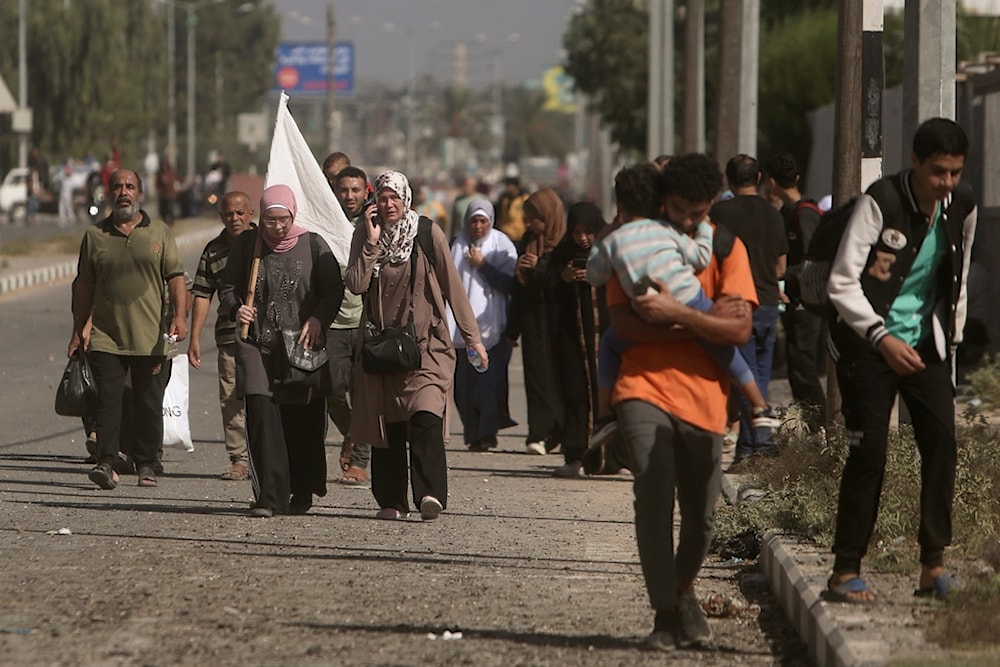Death of Israeli captives might force 'Israel' to change strategy: NYT
The Israeli occupation forces killing three of their own captives presenting themselves as civilians is drawing paramount criticism for its strategies in Gaza.
-

A woman carries a white flag to avoid being shot, as Palestinians flee Gaza City to the southern Gaza Strip on Salah al-Din Street in Bureij, November 7, 2023 (AP)
The Israeli occupation forces killing Israeli captives by friendly fire might force the Israeli regime to change its tactics and strategies in Gaza, the New York Times said Sunday.
According to the US news outlet, Israeli occupation forces opening fire on three unarmed, shirtless Israeli captives who were waving a white flag served as a resounding Israeli failure to uphold its claims to committing to not harming civilians.
The shooting and killing of Israeli captives, in turn, gave impetus to talks within the Israeli security establishment regarding a clearer approach in pursuit of the occupation's pursuit of its goals in Gaza as well as a potential change to approach.
The Israeli occupation forces committing their atrocities in Gaza, which they say would not stop until the "destruction of Hamas", prompted Israeli settlers, the likes of Ruby Chen, whose son was taken captive by the Palestinian Resistance during Operation al-Aqsa Flood, to say they were in favor of liberating Palestinian prisoners charged with murder if it meant the release of their children.
Chen, according to the NYT, said the families of the captives felt like they were trapped in a game of Russian roulette. "We have no time to lose - should we wait for another 10 hostages in coffins?"
Critics of the Israeli occupation used their killing of the Israeli settlers as a small example of how the IOF are highly nonchalant about their murder of civilians in Gaza.
"Under the laws of war, people are presumed to be civilians," the New York Times cited Sari Bashi, the program director at Human Rights Watch as saying. "There needs to be strong information to suggest they are not before you can kill them."
She added that the IOF did not follow said regulations and rules as there was nothing to suggest that those killed were not civilians, but they were killed ruthlessly despite waving a white flag.
This completely goes against the Israeli claims that its occupation forces are avoiding harming civilians in Gaza, though close to 20,000 people, 50% of whom are children and 20% of whom are women, were killed, and none of those deaths were investigated. The occupation, however, was quick to launch a probe into the killing of the three Israeli captives.
Thousands of Israeli captives' families protested on Friday evening in "Kaplan" Street, now known as the "Hostages Square" in "Tel Aviv", demanding that their government restart negotiations for a new prisoner exchange deal with the Palestinian Resistance, according to Israeli media.
The demonstrators started their protest at the entrance to the Ministry of Security and the General Staff Headquarters in "Tel Aviv," blocking roads following the announcement that three Israeli captives were shot and killed by occupation forces in the al-Shujaiya neighborhood, after "mistakenly" identifying them as Resistance fighters from Hamas' al-Qassam.
A one-week Qatari-Egyptian-mediated truce deal, which ended on December 1, saw 105 captives, including 80 Israelis, released from Gaza by the Palestinian Resistance, in exchange for 240 female and minor male Palestinian prisoners who were arbitrarily detained in Israeli occupation prisons.
A former journalist at Maariv stated, "You won't hear about this in the news; prisoners' families are now coming out for a spontaneous night of protest and anger... The demonstrators are raising their voices, emphasizing that they want the prisoners alive, not in coffins or in the Abu Kabir Forensic Institute.
"I don't know how the night will end, I don't know how many will join the Saturday night protest, but one thing is certain: the families no longer believe the government's lies," he stressed.
Israeli media also noted that among the protesters was Reserve Brigadier General Noam Tibon.
On Friday, the families threatened to begin a hunger strike after Israeli occupation Prime Minister Benjamin Netanyahu refused to meet with them, according to Yedioth Ahronoth.
The newspaper reported that 100 families of Israeli captives held in Gaza accused Netanyahu of working to divide their ranks "so that he does not respond to their demands."
Read more: Evacuated Israeli settlers refuse to return to north or south
Commenting on the Israeli army's killing of the three captives, Netanyahu said, "The killing of the three prisoners is a tragedy beyond measure, and all of Israel is mourning tonight."
Meanwhile, Israeli media reports suggest that the occupation entity is still far from resolving the ongoing war in the Gaza Strip.
Amnon Abramovich, a political analyst on the Israeli Channel 12, suggested that the problem lies in the "politicians' slogans or lofty goals," referring to the stated objectives for the war, which include "the liberation of prisoners and ending Hamas as a military and prevent it from holding power in Gaza."

 5 Min Read
5 Min Read








